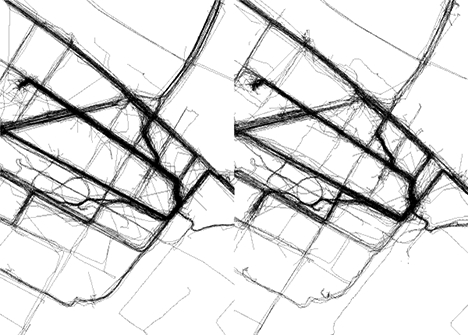DANIEL BELASCO ROGERS
London has a polemic network of public cameras controlled by the police, what do you think about being tracked for security reasons?
Hmm, this is a topic that I am increasingly interested in, angered by and feel like wanting to do something about. I find England a very strange case now I’ve left it! We have never had anything like an identification card and for years that was something we were proud of. Now we’re the most surveilled society in the world. I’ve seen this turn around in my lifetime and I wonder if those things are connected, somehow. We have 20 per cent of all cctv cameras globally. 4.2 million. It’s not just the cameras that bother me however. Now cameras have parabolic mics in them that can tune into conversation, we have gait recognition software to supposedly automatically spot someone acting suspiciously. Combine this with the fact that most ATMs now have cameras in, the bank knows exactly where you are, as do the all sorts of people you don’t particularly want to know. I have to say that the GPS units we carry about do not broadcast any signal. I could be tracked (like everybody else) through my mobile phone, bank card, bahn card, passport etc. but not through my GPS.

Do you believe tracking techniques such as mobile phone tracking are going against people’s privacy?
I think I would have to get into a long discussion about what exactly privacy is and that is outside of the scope of this interview. However, the challenge for today’s technocratic society is that we don’t lose sight of what we lose in terms of privacy every time we introduce some new, supposedly harmless technology for tracking, say, the movement of clothes round a shop. This technology doesn’t disappear of it’s own accord and governments are guilty of being seduced by the amount of data they can gather about their citizens. I think it gives them a sense of supreme power. We should be more informed about these steps and it should be each governments’ responsibility to inform it’s citizenship about exactly how much and what kind of data it stores on it. It should also be a requirement of every private enterprise (shops that offer you reward cards, for instance) to clearly inform the customer that they will use your data for analysis and marketing purposes and that that data will be sold on to other companies.
Tracking could save lives too…
Yes, and it does, there’s no argument about that but not always in the ways we think. The crime rate in the UK has NOT decreased significantly against other, less surveilled countries. I guess in the end, it’s just data. If you use the data to build a hospital in a region that really needs it, that’s one thing. I think that a lot of this surveillance culture that we’ve fallen into post 9/11 makes people feel paranoid, hunted, suspicious on a daily basis, that’s quite an impoverishment to our daily lives. Someone told me that it was as unlikely to be involved in a terrorist attack as winning the lottery. I thought that that was.
Did you ever consider your work as a criticism to the “big brother” culture?
Not really. I’m not interested in making issue-based work, work that criticises something specific in our society, that’s not the way I like to approach making work. I’m interested in knowing what we can do about things and how we approach the political through our own lives.
How long do you think you will keep on making maps?
That’s a very mortal question. Perhaps until I die or the technology changes. I don’t really have a reason to stop right now so I’m going to keep on doing it until the reason arises.
Any related exhibition soon?
There have been two exhibitions recently, in Scotland and Berlin. The best thing to do is check our web site.
Text: Eduard Prats Molner





